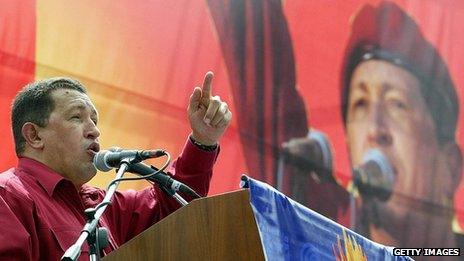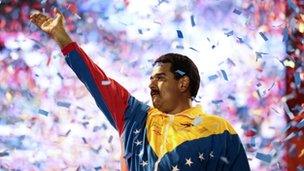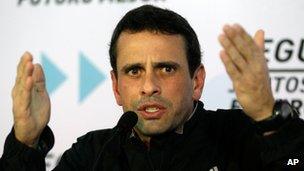How will Hugo Chavez's legacy impact Venezuela's polls?
- Published

Even after his death Hugo Chavez remains an omnipresent figure in Venezuela
Cannon fire resonates every afternoon in the working class neighbourhood of 23 de Enero in north-west Caracas.
The fire comes from the military headquarters where Hugo Chavez's remains lie: It marks the time of his death - 16:25 on 5 March.
A few metres from the headquarters there is a new chapel. Named after the neighbourhood where it stands, Saint Hugo Chavez del 23 is a tiny wooden shack.
People come to leave flowers and messages in front of a large poster of the former president, which hangs below the chapel's cross.
"He was our father, our brother, our friend," said Elisabeth Torres, who takes care of the chapel.
Every morning, she places a fresh cup of coffee next to a small bust of Mr Chavez as an offering. The late president was a passionate coffee drinker.
Ms Torres owns a small kiosk next to the chapel, which she says she was able to open thanks to one of the many social programmes that Mr Chavez implemented.
"He has not been sanctified, but he should be," she said, playing with a rosary which bears the face of Hugo Chavez.
"He is still our supreme commander."
Omnipresence
Ms Torres is not the only Venezuelan who wishes Mr Chavez could continue to lead the nation.
As the country heads to the polls on Sunday to pick Mr Chavez's successor, it is clear the late president and his legacy have dominated the campaign.

Nicolas Maduro was appointed by Mr Chavez as his preferred successor
Not only is his image plastered across the capital, Caracas, on posters and graffiti, his voice, too, still resonates on state television, which is rebroadcasting the highlights from his famous television show, Alo Presidente.
And neither candidate in Sunday's election has stopped mentioning his name.
Nicolas Maduro, who was handpicked by Mr Chavez as his successor in December, chose the late president's hometown to inaugurate his electoral campaign.
But it is still Mr Chavez's voice which booms out of loudspeakers singing the national anthem at Mr Maduro's campaign rallies.
Mr Maduro has been describing himself as a son and an apostle of Mr Chavez. He also told supporters that his mentor had appeared to him in the shape of a little bird to give him his blessing.
"I felt his spirit," said Mr Maduro. "I felt him there as if he was blessing us, telling us: 'Today the battle begins. Go to victory.'"
Political analyst John Magdaleno says it is only natural Mr Maduro should invoke Mr Chavez's memory.
"Mr Maduro is not a consolidated brand yet, the public don't see him as a consolidated leader, so he doesn't have any other choice than to use Mr Chavez's image," he said.
"It is too early to come out of Mr Chavez's shadow."
Optimistic opposition
The main opposition candidate, Henrique Capriles, has not been able to distance himself from Mr Chavez either.
Mr Capriles, who lost to Mr Chavez in last October's election, has been telling crowds of supporters about his first meeting with the late president.

Opposition leader Henrique Capriles believes he can win
He says he told Mr Chavez that "we are of different parties, but we are not enemies". And he has been trying to convince voters that "Nicolas [Maduro] is not Chavez".
He urges voters not to make a mistake electing a "bad candidate" who would be incapable of maintaining Mr Chavez's work.
In an interview with BBC Mundo, Mr Capriles said he was optimistic about the outcome of the elections.
"What will happen?... I think we will win. I managed to get 45% of the vote with less strength (in the streets)," he said, referring to the polls he lost to Mr Chavez.
But he faces an uphill battle as most of Mr Chavez's supporters want to respect what they see as their dead leader's wishes.
In December, Mr Chavez asked them to cast their votes for Mr Maduro if he were to die during his cancer surgery in Cuba.
And Mr Chavez's backing seems to have been working in Mr Maduro's favour, with recent polls suggesting he has a strong lead over Mr Capriles.
Tough comparison
But while invoking the memory of Mr Chavez may have been a good campaign strategy, working under his shadow may be risky for Mr Maduro in the long run, according to Mr Magdaleno.
"Maduro will eventually face a paradox," he said.
"Chavez's omnipresence in the political discourse will turn into a pattern of comparison, and it is a tough comparison [to live up to]."
"When people find out that Maduro is not Chavez, it will be a dead end for him," added Mr Magdaleno.
Back at the military headquarters, which have been turned into a museum since Mr Chavez's remains were taken there, Carmen Ascanio guides people from all over the country to see Mr Chavez's casket.
"Every time he came close to us, he irradiated energy and strength," she said.
She is part of the Bolivarian militia, named after independence hero Simon Bolivar and created by Mr Chavez to give military training to civilian volunteers.
She attended several ceremonies led by Mr Chavez, a former military officer.
"Our Comandante has now left us, but Nicolas [Maduro] is here and he will lead us in the future," she says to those taking the tour.
Sunday's vote will show whether Ms Ascanio is right and the memory of Mr Chavez is powerful enough to drive his hand-picked successor to a victory in the polls.
- Published9 April 2013
- Published8 April 2013
- Published3 April 2013
- Published7 March 2013